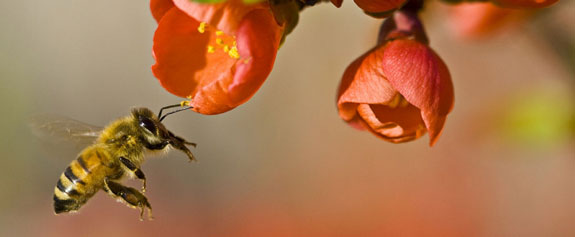Hooray! It’s National Pollinator Week!
By Chris Williams on June 16, 2014.

The fact that June 16-22 is National Pollinator Week may not have you jumping up and down, but it is being celebrated by those who love honey bees, and especially by those who have been concerned about the decline in the numbers of honey bees.
Pollinators are insects, animals, or other agents that carry and transfer pollen from the anther (male part) of a flower to the stigma (female part) to enable fertilization and reproduction. Flowers and crops wouldn’t exist without pollinators. Of course, our best known pollinators are the hard-working honey bees. It takes one colony of approximately 30,000 bees to pollinate one acre of fruit trees.
Bees Aren’t the Only Pollinators
 Honey bees get most of the press, but bumble bees, carpenter bees, and a whole slew of solitary bees are very important pollinators. Bees are not the only insect pollinators, either. An estimated 200,000 species of insects, including flies and beetles, pollinate plants at least occasionally. And, beyond the insects we have hummingbirds, bats, geckos, and other larger pollinators that visit flowers.
Honey bees get most of the press, but bumble bees, carpenter bees, and a whole slew of solitary bees are very important pollinators. Bees are not the only insect pollinators, either. An estimated 200,000 species of insects, including flies and beetles, pollinate plants at least occasionally. And, beyond the insects we have hummingbirds, bats, geckos, and other larger pollinators that visit flowers.
A significant event occurred last year during National Pollinator’s Week. A single insecticide application to flowering trees in an Oregon shopping mall parking lot accidentally killed 25,000-50,000 carpenter bees and bumble bees. While this was very bad news for the bees and resulted in a national outcry, it did result in some positive changes aimed at protecting bees. The Environmental Protection Agency promised changes in pesticide labels and a major focus on how current pesticide use affects bees. The other good news since last year is that honey bee colony winter survival is up slightly this year.
As professional pesticide applicators, exterminators are committed to the protection of honey bees and other pollinators. Exterminators routinely take precautions to protect bees when applying pesticides such as avoiding application in windy conditions, spraying only when bees are not foraging, and choosing pesticides wisely. At Colonial Pest Control, we join in celebrating National Pollinator Week!
Bee photo: Foter / Creative Commons Attribution 2.0 Generic (CC BY 2.0)
Hummingbird photo: jeffreyw / Foter / Creative Commons Attribution 2.0 Generic (CC BY 2.0)